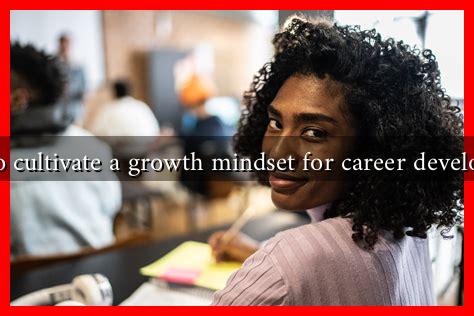-
Table of Contents
- How to Cultivate a Growth Mindset for Career Development
- Understanding the Growth Mindset
- Strategies to Cultivate a Growth Mindset
- 1. Embrace Challenges
- 2. Learn from Feedback
- 3. Cultivate Resilience
- 4. Set Learning Goals
- 5. Surround Yourself with Growth-Minded Individuals
- Case Studies and Real-World Examples
- Statistics Supporting the Growth Mindset
- Conclusion
How to Cultivate a Growth Mindset for Career Development
In today’s fast-paced and ever-evolving job market, the ability to adapt and grow is more crucial than ever. A growth mindset, a term popularized by psychologist Carol Dweck, refers to the belief that abilities and intelligence can be developed through dedication and hard work. This mindset fosters resilience, encourages learning, and ultimately leads to greater career success. In this article, we will explore practical strategies to cultivate a growth mindset for career development.
Understanding the Growth Mindset
Before diving into strategies, it’s essential to understand what a growth mindset entails. Individuals with a growth mindset believe that:
- Challenges are opportunities for growth.
- Effort is a path to mastery.
- Feedback is a valuable tool for improvement.
- Success is a result of perseverance and learning from failures.
In contrast, a fixed mindset leads to the belief that abilities are static and unchangeable, which can hinder career advancement. According to a study by Dweck, individuals with a growth mindset are more likely to achieve higher levels of success in their careers.
Strategies to Cultivate a Growth Mindset
Here are several actionable strategies to help you develop a growth mindset in your professional life:
1. Embrace Challenges
Instead of avoiding challenges, seek them out. Taking on new responsibilities or projects can stretch your abilities and enhance your skills. For example, if you’re in marketing, volunteering to lead a new campaign can provide valuable experience and insights.
2. Learn from Feedback
Constructive criticism is a powerful tool for growth. Instead of viewing feedback as a personal attack, consider it an opportunity to improve. Actively seek feedback from peers and supervisors, and use it to refine your skills. A study by the Harvard Business Review found that employees who actively seek feedback are more likely to advance in their careers.
3. Cultivate Resilience
Resilience is the ability to bounce back from setbacks. When faced with failure, reflect on what went wrong and how you can improve. For instance, if a project doesn’t go as planned, analyze the situation, learn from it, and apply those lessons to future endeavors.
4. Set Learning Goals
Instead of focusing solely on performance goals, set learning goals that emphasize skill development. For example, if you want to improve your public speaking, set a goal to attend a workshop or join a local Toastmasters club. This approach shifts your focus from outcomes to the process of learning.
5. Surround Yourself with Growth-Minded Individuals
Your environment plays a significant role in shaping your mindset. Surround yourself with colleagues and mentors who embody a growth mindset. Engage in discussions that challenge your thinking and encourage you to step outside your comfort zone.
Case Studies and Real-World Examples
Many successful individuals attribute their achievements to a growth mindset. For instance, Satya Nadella, CEO of Microsoft, transformed the company culture by promoting a growth mindset among employees. Under his leadership, Microsoft shifted from a fixed mindset to one that embraces learning and innovation, resulting in significant growth and market success.
Another example is J.K. Rowling, who faced numerous rejections before publishing the Harry Potter series. Her resilience and willingness to learn from feedback ultimately led to her becoming one of the best-selling authors in history.
Statistics Supporting the Growth Mindset
Research supports the benefits of a growth mindset in the workplace:
- A study published in the Journal of Personality and Social Psychology found that individuals with a growth mindset are more likely to achieve their goals.
- According to a report by the World Economic Forum, skills such as critical thinking and problem-solving are increasingly important in the job market, both of which are enhanced by a growth mindset.
Conclusion
Cultivating a growth mindset is essential for career development in today’s dynamic work environment. By embracing challenges, learning from feedback, cultivating resilience, setting learning goals, and surrounding yourself with growth-minded individuals, you can enhance your skills and advance your career. Remember, the journey of growth is continuous, and every step you take towards adopting a growth mindset will bring you closer to achieving your professional aspirations.
For further reading on the growth mindset, consider exploring Carol Dweck’s book, Mindset: The New Psychology of Success.


